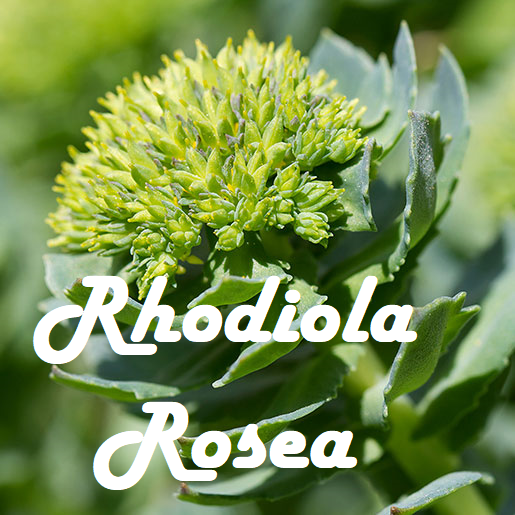Rhodiola Rosea
Rhodiola rosea is a plant that grows in cold regions of Europe and Asia. The root has a long history of use in traditional medicine. Rhodiola is considered an adaptogen. Adaptogens are a class of natural substances believed to stimulate the body’s resistance to physical, environmental, and emotional stressors. Rhodiola extract may help protect cells from damage and regulate heart rate.
people have used rhodiola for fatigue, anxiety, depression, stress and many other conditions, but there is not enough scientific evidence to support these uses.
Rhodiola rosea, also called golden root, rose root, or arctic root, is a Siberian plant that thrives in dry, cold arctic climates. It is often used in herbal medicine. Rhodiola‘s medicinal compounds are derived from the root of the plant and have been used to treat occasional stress, anxiety, mental and physical fatigue, and depressed mood
Combat Stress & Anxiety
Rhodiola rosea (or R. rosea) is a species of plant that is related to ginseng, otaheitea and other adaptogens. Adaptogens are plants that adapt the body to physical and mental stress. Research has shown that rhodiola may stimulate serotonin, norepinephrine and dopamine activity. They are thought to be involved in healthy emotional and neurological functioning.
Rhodiola rosea (or R. rosea) is a species of plant that is related to ginseng, otaheitea and other adaptogens. Adaptogens are plants that adaIn a minor investigation, 10 individuals who had generalized anxiety disorder were given 340 mg of rhodiola every day. After 10 weeks, each one of the individuals who were administered rhodiola showed lower stress scores than when they began the experiment.
As an adaptogen, rhodiola helps to keep the nervous system from going into ‘fight or flight’ mode. In animal studies, it has been established that rhodiola suppresses the release of cortisol-the stress hormone.
By keeping cortisol levels in check, rhodiola might help those faced with minimal anxiety to extreme tension manage their signs more effectively.pt the body to physical and mental stress. Research has shown that rhodiola may stimulate serotonin, norepinephrine and dopamine activity.
They are thought to be involved in healthy emotional and neurological functioning.
Enhances Brain & Cognitive Function
Studies have shown that Rhodiola may help to reduce stress-induced cognitive impairments.
Cortisol, which is produced in increased amounts during periods of high stress, can cause foggy thinking, difficulty concentrating and even short-term memory loss.
A 28-day study showed supplementing with 576 mg of a standard Rhodiola extract daily improved concentration, attention span and overall cognitive performance.
Heart & Blood Pressure:
In addition to reducing stress, Rhodiola appears to help lower blood pressure. If blood pressure rises too high due to arterial plaque, it can put you at risk for heart disease. Although no studies have been conducted on human patients, hypertensive rats have shown a reduction in blood pressure with rhodiola intervention. Rhodiola has been shown in animal models to protect the heart from stress-induced damage.
Weight loss & Metabolism benefits:
Research shows that rhodiola has an anti-diabetic effect that promotes metabolism. Rhodiola has the ability to lower blood sugar and insulin resistance, according to a recent publication in Scientific Reports. High blood sugar and high insulin resistance are the most important indicators of prediabetes and diabetes, which can be noticed when you start experiencing unhealthy weight gain.
An Great boost for Workout & Endurance:
Recommended dosage & use:
Rhodiola rosea is available in several forms – powder, tincture, fresh and pill – as well as supplements with other additional ingredients. It is always recommended to start using any new supplement in a smaller dosage to test your interaction with it. As for dosage, start small and work your way up.
Suggested “Start with one-eighth of a teaspoon a day if you’re using a powder that contains, say, about 3 percent salidozide, then add slowly to find the sweet spot. For most, it’s usually between 100mg Up to 400 milligrams a day.
If you don’t see this benefit, it’s worth exploring other options.”
It’s also important to remember that adaptogens usually work in your body over time, so try to incorporate them into your daily routine for maximum benefits. As functional medicine physician Frank Lipman, M.D. says, “In my experience, most patients using rhodiola begin to feel better within a few weeks or months,” so be patient. If you want, you can take a break from time to time to see if the herbs are really working.
Bottom line, the antioxidant, anti-inflammatory, and stress-fighting actions of rhodiola make it beneficial for your health in various ways. There’s still a lot for modern science to learn about this herb, but it has a long history of medicinal use in Scandinavia and Russia. From what’s known so far, rhodiola can help counter the effects of stress on both the mind and body; it increases mental attention and focus, while improving physical endurance.
